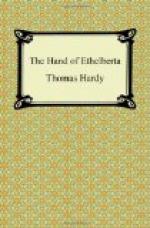‘You had better not try any such wild thing.’
The creaking of a door was heard. ‘O Sol,’ she said appealingly, ’don’t go into the question whether I am right or wrong—only remember that I am very unhappy. Do help me—I have no other person in the world to ask! Be under the balcony at six o’clock. Say you will—I must go—say you will!’
‘I’ll think,’ said Sol, very much disturbed. ’There, don’t cry; I’ll try to be under the balcony, at any rate. I cannot promise more, but I’ll try to be there.’
She opened in the panelling one of the old-fashioned concealed modes of exit known as jib-doors, which it was once the custom to construct without architraves in the walls of large apartments, so as not to interfere with the general design of the room. Sol found himself in a narrow passage, running down the whole length of the ball-room, and at the same time he heard Lord Mountclere’s voice within, talking to Ethelberta. Sol’s escape had been marvellous: as it was the viscount might have seen her tears. He passed down some steps, along an area from which he could see into a row of servants’ offices, among them a kitchen with a fireplace flaming like an altar of sacrifice. Nobody seemed to be concerned about him; there were workmen upon the premises, and he nearly matched them. At last he got again into the shrubberies and to the side of the park by which he had entered.
On reaching Corvsgate he found Picotee in the parlour of the little inn, as he had directed. Mr. Julian, she said, had walked up to the ruins, and would be back again in a few minutes. Sol ordered the horse to be put in, and by the time it was ready Christopher came down from the hill. Room was made for Sol by opening the flap of the dogcart, and Christopher drove on.
He was anxious to know the trouble, and Sol was not reluctant to share the burden of it with one whom he believed to be a friend. He told, scrap by scrap, the strange request of Ethelberta. Christopher, though ignorant of Ethelberta’s experience that morning, instantly assumed that the discovery of some concealed spectre had led to this precipitancy.
‘When does she wish you to meet her with the carriage?’
’Probably at half-past seven, at the west lodge; but that is to be finally fixed by a note she will hand down to me from the balcony.’
‘Which balcony?’
‘The nearest to the yew-tree.’
‘At what time will she hand the note?’
’As the Court clock strikes six, she says. And if I am not there to take her instructions of course she will give up the idea, which is just what I want her to do.’
Christopher begged Sol to go. Whether Ethelberta was right or wrong, he did not stop to inquire. She was in trouble; she was too clear-headed to be in trouble without good reason; and she wanted assistance out of it. But such was Sol’s nature that the more he reflected the more determined was he in not giving way to her entreaty. By the time that they reached Anglebury he repented having given way so far as to withhold a direct refusal.




